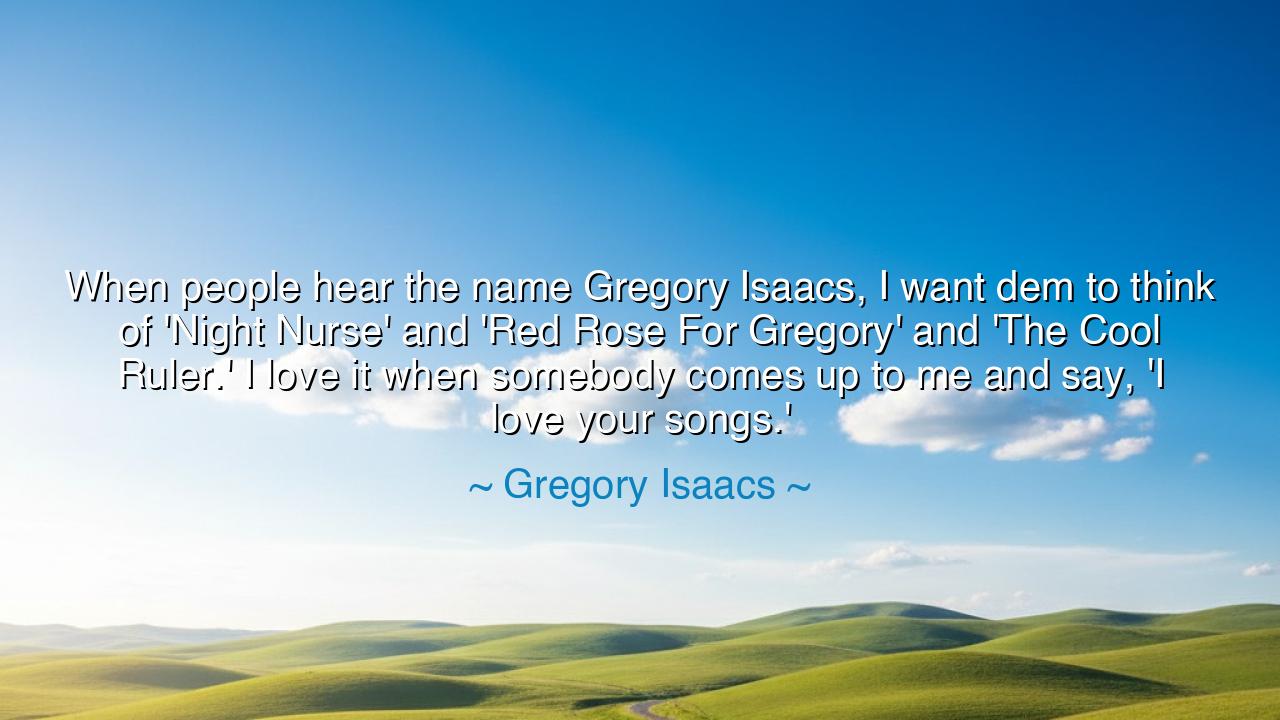
When people hear the name Gregory Isaacs, I want dem to think of
When people hear the name Gregory Isaacs, I want dem to think of 'Night Nurse' and 'Red Rose For Gregory' and 'The Cool Ruler.' I love it when somebody comes up to me and say, 'I love your songs.'






"When people hear the name Gregory Isaacs, I want dem to think of 'Night Nurse' and 'Red Rose For Gregory' and 'The Cool Ruler.' I love it when somebody comes up to me and say, 'I love your songs.'" These words spoken by the legendary Gregory Isaacs encapsulate a deep desire to leave behind a legacy—not just of fame or success, but of meaningful impact through his music. Isaacs, known for his soulful voice and rich reggae rhythms, expresses a wish to be remembered not only for the titles of his songs but for the emotional resonance they carry within the hearts of his listeners. To be remembered by the music that defined his artistry and the emotions his songs evoked in others is, for Isaacs, the true measure of success.
In the ancient world, the concept of legacy was just as important. Great heroes, kings, and artists were often remembered not only for their actions or achievements but for the art and stories they left behind. Homer, for instance, did not just write about the deeds of gods and heroes; he immortalized their voices and values. For centuries, his epics have defined much of Western thought on heroism, fate, and humanity. His works, much like Gregory Isaacs’ songs, were not meant merely for their own time; they were meant to echo through history, to resonate with generations to come. Isaacs, in a similar fashion, seeks to have his music not only appreciated in the present but to become a lasting part of the cultural soundscape.
The desire to be remembered for one’s artistic contributions can be seen in the lives of many legendary figures, such as Wolfgang Amadeus Mozart, who, though tragically dying young, left behind a treasure trove of music that would define classical music for centuries. Like Isaacs, Mozart did not seek fame for fame's sake but wanted his compositions to speak to the hearts of people, to evoke emotions and to remain timeless. Mozart's music is not merely admired for its technical brilliance but for its emotional depth, its ability to connect with listeners across time and place. Both Isaacs and Mozart shared a common desire—to be remembered for the music that touched others’ souls, music that would live on long after the artists themselves.
In Gregory Isaacs’ case, it was the distinctive power of his voice, the vulnerability in his lyrics, and the smooth melodies of "Night Nurse" and "Red Rose For Gregory" that left an indelible mark on reggae music. His music was more than just a soundtrack for his generation; it was a reflection of the emotions, struggles, and desires of his listeners. These songs, like ancient hymns or ballads, became anthems for those who identified with the feelings they expressed. Isaacs' songs were deeply personal and yet universal, resonating with the hearts of fans around the world. For Isaacs, this connection to his audience—this emotional reciprocity—was the most meaningful form of recognition.
When Isaacs says, “I love it when somebody comes up to me and says, ‘I love your songs,’” he is acknowledging that the true reward of his artistry lies in the connection it creates. It is not the fleeting applause of the stage, the fleeting moments of fame, but the lasting impact his songs have on people’s lives. Much like the ancient bards or poets, whose works were passed down orally and written down to survive the test of time, Isaacs understands that the true value of music lies in its ability to connect generations, to move people, and to transcend the boundaries of time.
The lesson in Isaacs' words is clear: it is not enough to create; one must create with a purpose. Art should be made not just to reflect the creator's soul but to reach the souls of others. In living our lives and pursuing our passions, we should strive to create works—whether in music, art, literature, or any other form—that leave a legacy of meaning, something that will continue to touch the hearts of others, long after we are gone. Like Isaacs, we must find purpose in creating something that endures.
To live by this teaching, we must first consider the value of our work—not just as an expression of our own desires but as something that can connect with others. In every action we take, whether creative or otherwise, we should ask ourselves: What legacy do we wish to leave behind? Are we creating for personal gain, or are we creating to move others, to inspire and touch lives? The true worth of our work is not measured by fleeting fame or recognition, but by the lasting impact it has on the hearts of those who encounter it. And like Gregory Isaacs, we should cherish the moments when others connect with the work we have done, for that connection is the ultimate form of success.






AAdministratorAdministrator
Welcome, honored guests. Please leave a comment, we will respond soon